<i>The Gilded Age</i> Season 3, Episode 7 Recap: Bombshells Galore

Spoilers below.
Truman Capote was not the first writer to spill secrets about his wealthy friends and then face social exile. Nearly a century before Capote’s “La Côte Basque, 1965” hit newsstands, Ward McAllister sent shockwaves down Fifth Avenue and beyond with his tell-all book about New York City’s elite. Mrs. Astor might be glad to know that Society as I Have Found It is a forgotten title in the 21st century, but the penultimate episode of The Gilded Age’s third season (which was just renewed for a fourth season) uses this sensational release to highlight the limits of power and connections.
Ward McAllister isn’t the only one facing a frosty reception. Bertha returns from England to a husband and son who can barely stand to be in the same room with her. Larry’s joy at finding success in Arizona is quickly overshadowed when he reads Marian’s letter; he cannot understand why she has broken off their engagement. Marian isn’t the only heartbroken resident at the Forte home as Oscar struggles to hide his grief after the death of John Adams.
Elsewhere, it is a gossip-heavy week as the Russell staff lay a trap and Elizabeth Kirkland learns something shocking about Peggy. The biggest surprise comes at the end of “Ex-Communicated” when more blood is shed; for the second week in a row, a life hangs in the balance. Did someone shoot George Russell?
A Scandalous Tell-All MemoirThe 1975 literary bombshell from Capote became the foundation for Ryan Murphy’s Feud: Capote vs. the Swans, showcasing the writer’s quick downfall. The reaction from the high society set in The Gilded Age to McAllister’s gossipy exposé is equally swift (in reality, McAllister’s memoir was published in 1890, whereas these scenes take place in 1884). Mrs. Astor calls a meeting to discuss the next steps against her former confidante. Despite the fraught mood, Ada is thrilled to have been asked to host this gathering, even if the attendees are more concerned with the book’s contents and not the parlor where they sit. Mrs. Fish is fuming because McAllister had the nerve to suggest that her husband is “very cheap when it comes to choosing wine.” The horror! No one else brings up specific sordid details, but they ultimately decide to excommunicate McCalister. He shall not be coming to Mrs. Astor’s end-of-year ball at Newport.
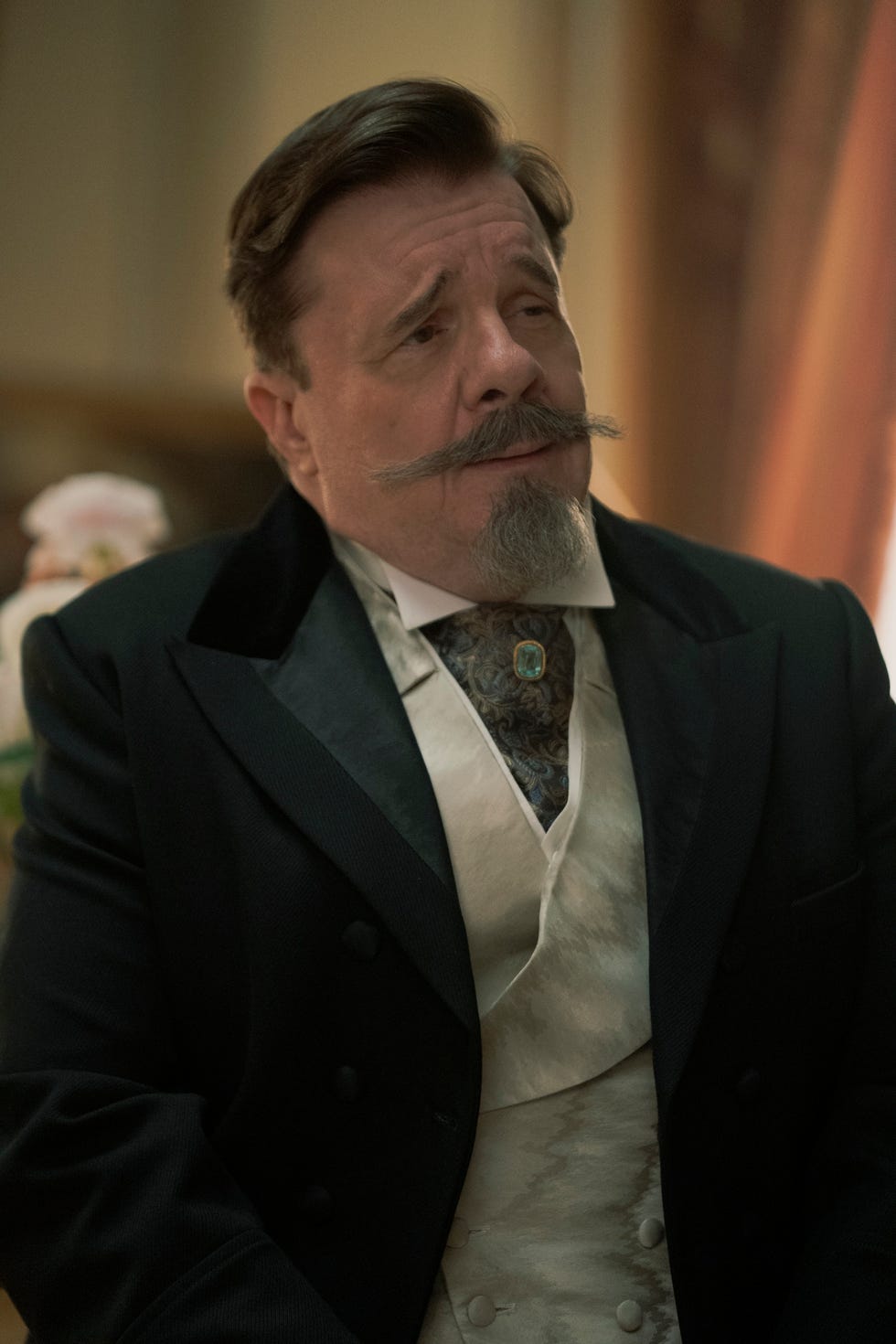
Downstairs, Armstrong cannot get enough of this deep dive into New York’s wealthy citizens, even if there are comments about Oscar in the book that she does not understand.
McAllister quickly learns he is public enemy number one. His name is absent from exclusive lists, and Mrs. Astor refuses to see him. Everything is piling on Mrs. Astor all at once as her daughter’s husband is filing for divorce, and there is very little she can do to stop this perceived disgrace. Mrs. Astor plans to cancel the festivities in Newport due to the ongoing scandals, although Bertha thinks that the party should proceed as it sends a message against the naysayers. When Bertha leaves Mrs. Astor’s home, she ignores McAllister as he attempts to reason with her.
But McAllister doesn’t slink away quietly, barging his way into see Mrs. Astor (who he knows is home). Instead of coming in on his hands and knees, McAllister fires off a list of his achievements within the New York social scene (“I am society,” he says). He is the one who blended the old with the new, introducing European decor and fashion to an American audience. It was also he who dreamed up the list of 400, giving new meaning to exclusive guest lists. However, McAllister pushes it too far, pointing out that when they first met, Mrs. Astor was a sad, rich lady whose husband preferred the company of showgirls. This scene plays out like a bitter breakup where you say the most hurtful thing you can muster.
Later, he finds a more welcoming figure when he visits Bertha at home. He explains his memoir was to show the rest of the country a peek behind the elite curtain (Stars! They’re just like us, the 1880s version). What he did was fly too close to the sun. Bertha mentions that Mrs. Astor has asked if she can host the Newport ball, as there were too many complaints when she threatened to cancel. Bertha tries to downplay her happiness, but relishes this opportunity to influence society. First, she wants to end the ban on divorced women.
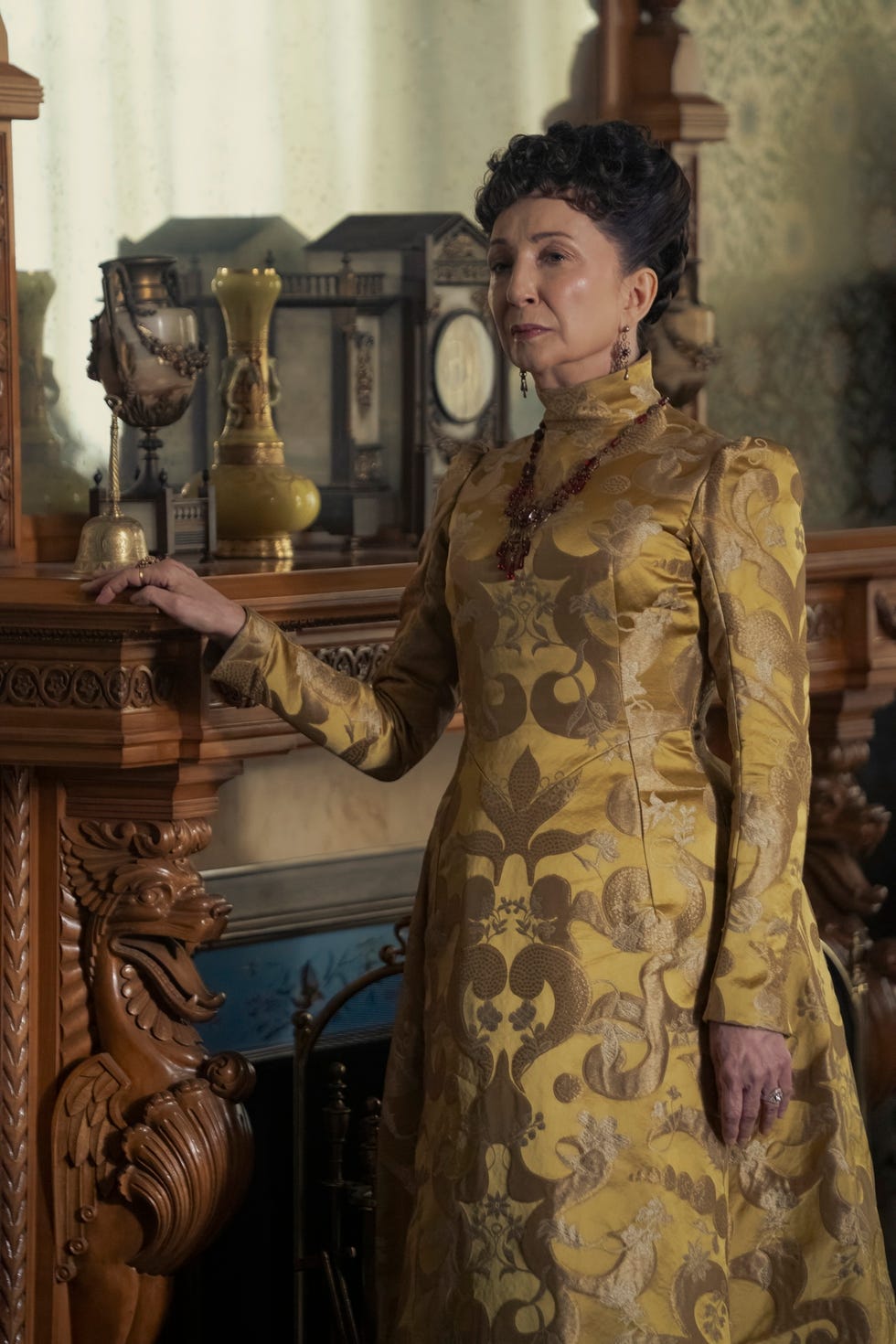
McAlister uses this opportunity to ask if Bertha will invite him, but this is a step too far. Men have long been forgiven for their dalliances, while women like Aurora Fane are punished. Bertha knows her limitations in her new role as a society leader (no matter how temporary): “Nothing is more perilous than to overestimate your own power.”
George and Bertha’s Woes ContinueBertha is setting up a society for divorced women, but not because she thinks her marriage is irreparable. However, relations with George are still precarious. George gives zero fucks about McAllister’s book as he has bigger issues to deal with. Finally, he confesses that business is worse than it has ever been, proving Bertha is not the only one keeping secrets. George doesn’t fully believe Bertha when she says Gladys is okay in England. If only he had seen how his wife and daughter collaborated at Sidmouth.
What Bertha wants is for them to appear as a family at the ball (Gladys and Hector are sailing over), so they can stop the ugly rumors with the truth. Bertha doesn’t comprehend that the unvarnished reality is probably worse than what McAllister wrote. It doesn’t get better for Bertha when Larry returns. Even though the copper will save the business (yes, it is as easy as that), Larry jumps to the incorrect conclusion that his mother had something to do with Marian breaking off their engagement. George thinks his son is onto something, considering her record, and both men decide to stay at the Union Club away from her. George says her ambition is out of control, and she never asks what they want. George makes a few valid points, but it is unpleasant watching these two men think the worst of her.
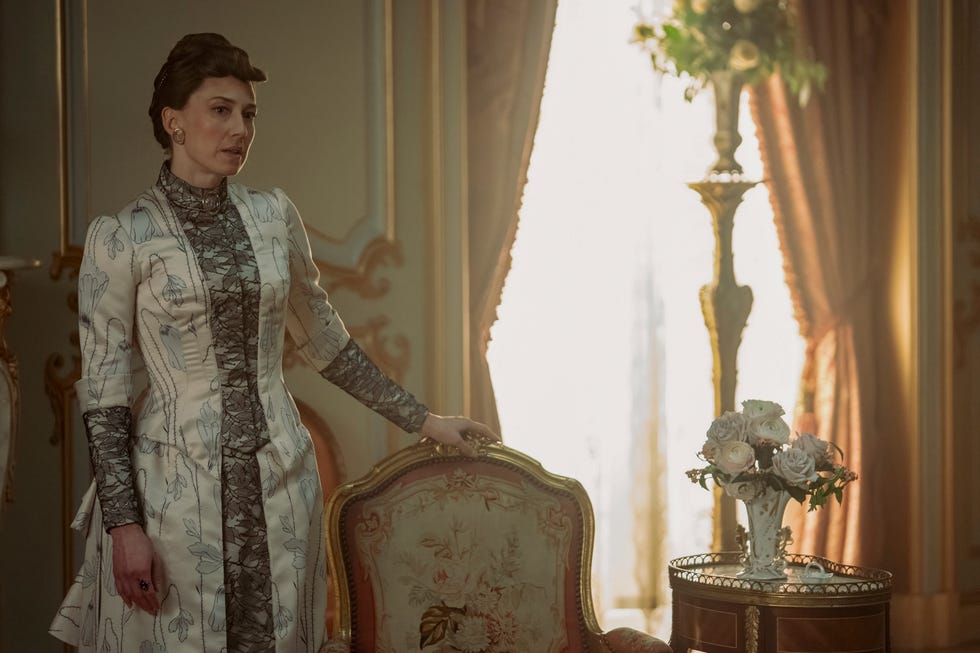
Bertha wasn’t exaggerating that Gladys is thriving at Sidmouth. Not even a letter from George to Hector saying payments will be delayed has an impact on the newlyweds. Lady Sarah wonders if they can send Gladys back if the money runs out, but Hector does not want that. Hector has been paying attention when it comes to Gladys. He recalls she wore a lilac dress to the opening night of the Met, and he has lilacs from the garden put in Gladys’s room. This gesture touches Gladys, who tells her husband that he has strong instincts that he needs to start using instead of relying on his sister. The message is getting through, as Lady Sarah is told to spend more time in London and find a place of her own.
Another item to add to the win column is that the Russells no longer have to worry about the gossip leak coming from inside the house. Church, Mrs. Bruce, and Mr. Borden successfully get Miss Andre to reveal her hand using the age-old tactic of planting a rumor to see if it winds up in the paper. Church sees Miss Andre take the bait, including watching her take an envelope from a man in the park. “Money is money,” Miss Andre explains. She was getting $40 for each story that went to print, and business is booming. But she’ll have to find her stories elsewhere, as she is ousted from the Russell house.
Oscar Nearly Comes Out“He’s a man. Men don’t feel these things the way we do,” says Agnes about how Oscar is responding to the death of John Adams. It couldn’t be further from the truth, which Agnes will soon learn. First, Oscar has a meeting with John’s sister, Nancy Adams Bell (Kate Baldwin). There were no secrets between John and his sister, and she is incredibly kind and empathetic. Nancy reveals that John has left his summer home upstate to Oscar. There is no official documentation, but she knew this was what her brother wanted. Oscar has never said no to something worth this much, but he thinks it is too big to accept. Nancy rejects his gracious attempt, insisting that he take the property where the former couple shared happy memories.
When Oscar arrives home, he snaps at his Aunt Ada when she asks if he is okay. Oscar reveals that John left him a cottage in Livingston Manor with a view of Hunter Lake. Agnes asks if this is because Agnes’s mother’s family settled this area in 1750. Otherwise, she can’t think of any other reason why John would bequeath her son something this sizable. Of course, this is not the reason why.
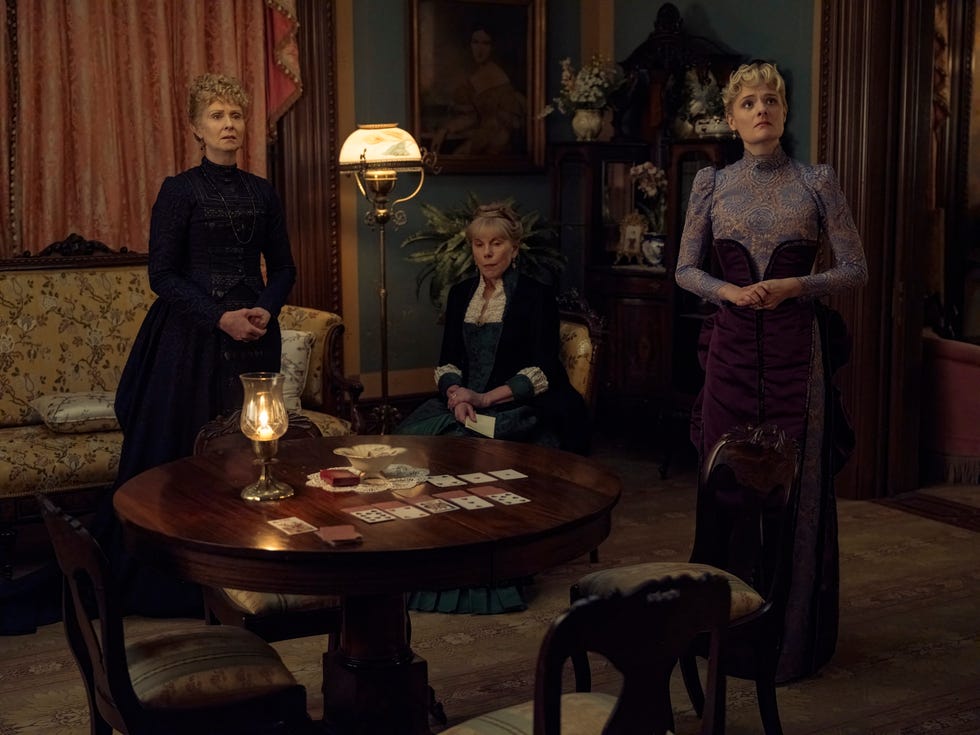
Oscar’s grief quickly pours out as he says he can’t be too cheerful or too sad. “I’m sure you don’t want to hear that I miss him,” he yells. Oscar then begins to weep, and it is impossible not to get teary at the anguish of not being able to reveal the depths of his love for John. What follows is the closest thing to a coming out scene in this home. Oscar describes the torment of sitting at the back of the church for John’s funeral. He stops short before fully saying where his rightful place was. Agnes can’t fathom what this is all about. Oscar asks if she “really wants to know,” which I am not sure if she does. Marian interjects, saying Oscar is upset because the man who saved him—for no other reason than kindness—is dead. The look on Agnes’s face suggests she is piecing together why Oscar is so broken.
Marian visits Oscar in his room, revealing she is not as naive as she often appears. They never say the word “gay,” “ but it is clear they are on the same page. Oscar thinks she would look away from him (as society would) if she knew the truth. Marian admits she is no expert in these matters, but she is not going to turn her back on her cousin. All she wants to do is help. Oscar says she has already done more than she could ever know.
Marian and LarryWhile Marian is a good listener regarding her cousin’s sexuality, she is not willing to hear Larry out. I was hoping that after Marian had time to think things over, she would be open to letting Larry explain. Instead, she digs her heels in. First, she refuses to see Larry. Ada is left standing on the doorstep trying to field Larry’s questions. Larry refuses to take the engagement ring back, telling Ada the lack of answers is confounding: He is heartbroken.
Ada thinks it is unfair for Marian to leave Larry in the dark. Marian reverts to blaming her past experiences, as every man she has known has let her down. Marian thinks she might be better off as a spinster, earning a necessary rebuke from her aunt. Ada talks from her experience of loneliness, and says it is better that she loved briefly than spent her life alone. It ends with the pair sharing a hug, but Marian needs to stop letting fear dictate her actions.
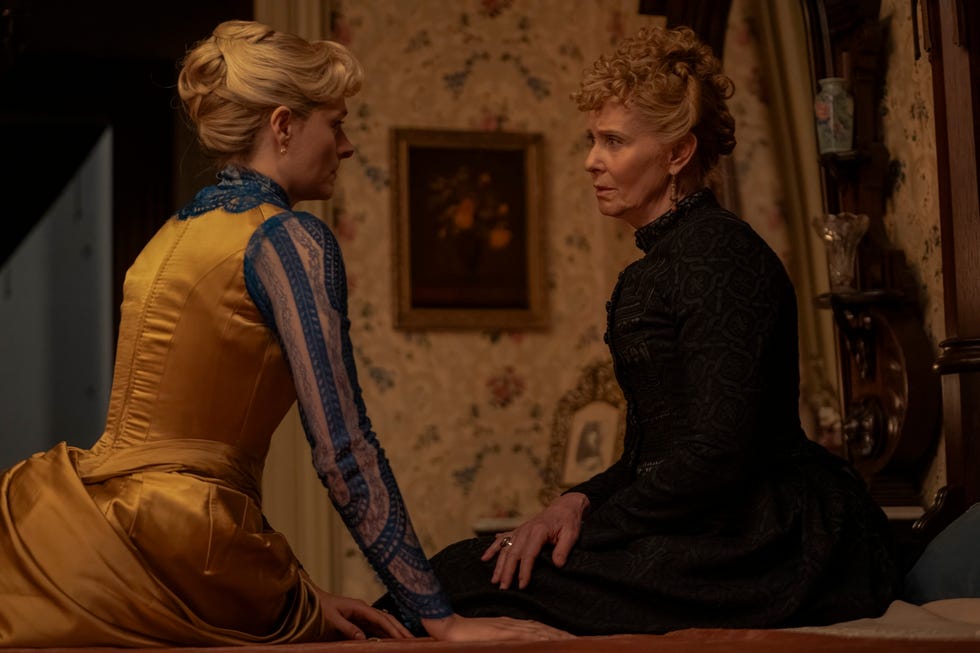
Rather than wait, Larry goes to see Marian at the school where she works. Marian reveals that she knows he wasn’t at Delmonico’s, but at a “house of ill repute.” Larry disputes the latter, explaining that the Haymarket is a club where “entertainments are arranged that are not the most respectable.” The reason he didn’t tell her where he was going is that he didn’t want her to think the worst. Rather than laugh off the silly misunderstanding, their engagement is still off.
Later, while Marian is helping Jack look for a house to buy, the subject of Larry comes up. Jack feels guilty as he is the one who accidentally spilled the Haymarket secret, and he wants to make it clear that Larry did nothing wrong. Jack says he was with Larry all night and knows there was nothing shady going on. Even if this does resolve everything, Marian’s trust issues need to be addressed.
The Suffrage Meeting and Peggy’s PastMarian is also in attendance at the suffrage meeting that Peggy is hosting with Frances Ellen Watkins Harper as the guest speaker. When Marian’s school can no longer host the event (because the husband of the main sponsor got cold feet), Ada offers up her home. Unlike temperance (which Ada has stopped talking about), Agnes is a keen supporter of this cause. But at this gathering, Agnes does everything she can to avoid the woman from the New York Heritage Society, as Agnes thinks she is being targeted for money she doesn’t have.
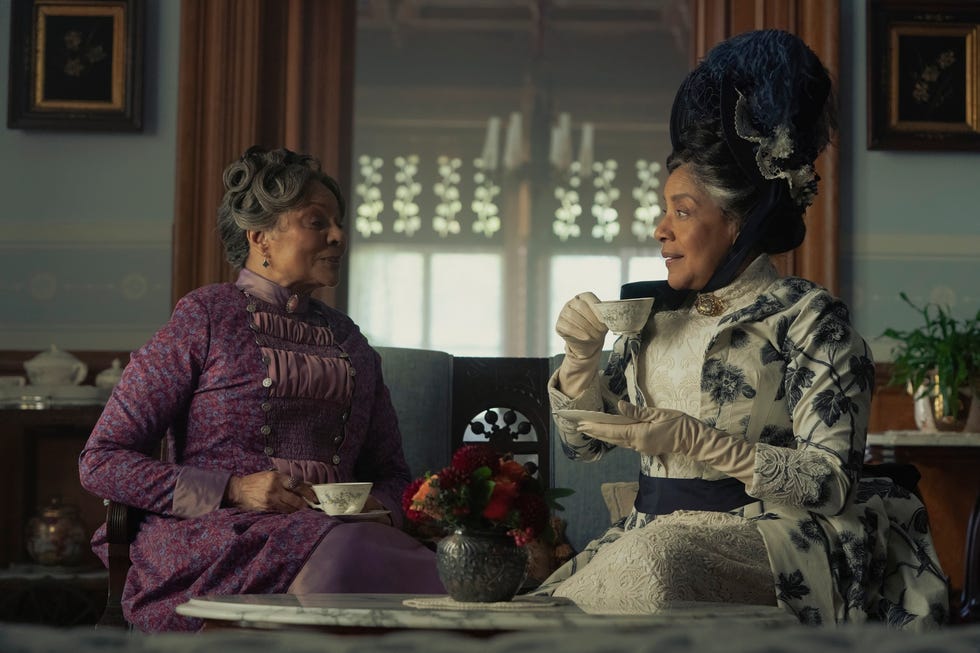
Much to Peggy’s relief, Elizabeth Kirkland isn’t in the audience. Earlier, William told Peggy he is impressed with everything she does. Peggy thinks that his mother disagrees with this assessment. Peggy is right. Elizabeth would do anything to break up this burgeoning romance, which is why she is so quick to act when she learns from a friend about the Easter service Peggy and her parents attended in Philadelphia last spring. It was at this service that Peggy and her parents honored her dead son, who died from scarlet fever. Elizabeth wants to know why news of Peggy having been married but giving up her child for adoption is only coming to light now—of course, Elizabeth is only hearing speculation, not truth.
Elizabeth immediately takes a train to William, but unlike Marian, William wants to hear Peggy’s side before jumping to conclusions. It is late, but William makes a house call at 61st Street—we shall have to wait for the finale to see what happens.
Clay’s Home TruthsAt George’s office, the mood has drastically improved. The copper mines are a Hail Mary that gives George the leverage to get his business back on track (quite literally) as he has the capital to buy enough of the Merrick shares to take control of the Illinois Central Line. George takes great pleasure in telling Mr. Sage and Clay that he has won. Sage immediately fires Clay for failing to see the value of those copper mines and losing power. Clay seems unbothered, telling George he is like a cockroach.
Always listen to what people tell you. George receives a delivery at the office later on, but this is not a parcel. Instead, a gunman opens fire, shooting a secretary and then turning the gun toward George. The trigger is pulled, but we don’t see who (if anyone) the bullet hits. And here I was thinking John Adams getting hit by a horse and carriage was gasp-worthy. Now we have to wait another week to find out George’s fate in the season 3 finale of The Gilded Age.
elle




